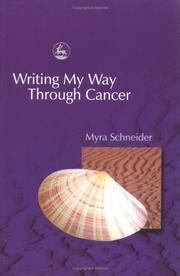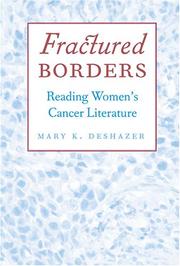| Listing 1 - 10 of 11 | << page >> |
Sort by
|

ISBN: 1283904594 1417501979 1846424003 9781417501977 9781846424007 1843101130 9781283904599 Year: 2003 Publisher: London New York Jessica Kingsley Publishers
Abstract | Keywords | Export | Availability | Bookmark
 Loading...
Loading...Choose an application
- Reference Manager
- EndNote
- RefWorks (Direct export to RefWorks)
Diagnosed with breast cancer in February 2000, poet and author Myra Schneider turned to her writing to help her come to terms with the experience. In this thoughtful and readable book, she illustrates how writing helped her through diagnosis, treatment and recovery as well as the change in self-image following her mastectomy.
Breast --- Cancer patients' writings. --- Creative writing --- Writings of cancer patients --- Literature --- Cancer --- Patients --- Therapeutic use. --- Schneider, Myra, --- Health.
Book
ISBN: 981166112X 9811661111 Year: 2022 Publisher: Gateway East, Singapore : Springer,
Abstract | Keywords | Export | Availability | Bookmark
 Loading...
Loading...Choose an application
- Reference Manager
- EndNote
- RefWorks (Direct export to RefWorks)
Caregivers' writings. --- Patients' writings. --- Alzheimer's disease --- Patients. --- Alzheimer's patients --- Writings of patients --- Literature --- Writings of caregivers
Book
ISBN: 9780815653066 0815653069 9780815633792 0815633793 Year: 2015 Publisher: Syracuse, New York
Abstract | Keywords | Export | Availability | Bookmark
 Loading...
Loading...Choose an application
- Reference Manager
- EndNote
- RefWorks (Direct export to RefWorks)
Sanatoriums in literature. --- Patients' writings --- Tuberculosis and literature. --- Yiddish poetry --- Writings of patients --- Literature --- Literature and tuberculosis --- Yiddish literature --- History and criticism.

ISBN: 1282591452 9786612591457 047202468X 9780472024681 0472069098 0472099094 9780472069095 9780472099092 9781282591455 6612591455 Year: 2005 Publisher: Ann Arbor
Abstract | Keywords | Export | Availability | Bookmark
 Loading...
Loading...Choose an application
- Reference Manager
- EndNote
- RefWorks (Direct export to RefWorks)
American literature --- Cancer in literature. --- Cancer --- Cancer patients' writings, American --- Women and literature --- Cancer in women --- Autobiography. --- Autobiographies --- Autobiography --- Egodocuments --- Memoirs --- Biography as a literary form --- Women --- Literature --- American cancer patients' writings --- Cancers --- Carcinoma --- Malignancy (Cancer) --- Malignant tumors --- Tumors --- English literature --- Agrarians (Group of writers) --- Women authors --- History and criticism. --- Patients --- Historiography. --- History and criticism --- Technique --- Diseases
Book
ISBN: 9781503607330 150360733X 9781503605152 1503605159 Year: 2019 Publisher: Stanford, California
Abstract | Keywords | Export | Availability | Bookmark
 Loading...
Loading...Choose an application
- Reference Manager
- EndNote
- RefWorks (Direct export to RefWorks)
At the turn of the twentieth century, tuberculosis was a leading cause of death across America, Europe, and the Russian Empire. The incurable disease gave rise to a culture of convalescence, creating new opportunities for travel and literary reflection. Tubercular Capital tells the story of Yiddish and Hebrew writers whose lives and work were transformed by a tubercular diagnosis. Moving from eastern Europe to the Italian Peninsula, and from Mandate Palestine to the Rocky Mountains, Sunny S. Yudkoff follows writers including Sholem Aleichem, Raḥel Bluvshtein, David Vogel, and others as they sought "the cure" and drew on their experiences of illness to hone their literary craft.Combining archival research with literary analysis, Yudkoff uncovers how tuberculosis came to function as an agent of modern Jewish literature. The illness would provide the means for these suffering writers to grow their reputations and find financial backing. It served a central role in the public fashioning of their literary personas and ushered Jewish writers into a variety of intersecting English, German, and Russian literary traditions. Tracing the paths of these writers, Tubercular Capital reconsiders the foundational relationship between disease, biography, and literature.
Tuberculosis in literature. --- Jewish literature --- Jewish authors --- Tuberculosis patients' writings --- Tuberculosis and literature. --- Hebrew literature, Modern --- Yiddish literature --- Literature and tuberculosis --- Writings of tuberculosis patients --- Literature --- Authors --- History and criticism. --- Diseases --- History.
Book
ISBN: 9781922146977 1922146978 9781922146984 1922146986 9781922146939 Year: 2015 Publisher: Artamon, N.S.W.
Abstract | Keywords | Export | Availability | Bookmark
 Loading...
Loading...Choose an application
- Reference Manager
- EndNote
- RefWorks (Direct export to RefWorks)
Small Acts of Disappearance describes the author’s affliction with an eating disorder which begins in university, and escalates into life-threatening anorexia over the next ten years. Fiona Wright is a highly regarded poet and critic, and her account of her illness is informed by a keen sense of its contradictions and deceptions, and by an awareness of the empowering effects of hunger, which is unsparing in its consideration of the author’s motives and actions.The essays offer perspectives on the eating disorder at different stages in Wright’s life: at university, where she finds herself in a radically different social world to the one she grew up in, in Sri Lanka as a fledgling journalist, in Germany as a young writer, in her hospital treatments back in Sydney. They combine travel writing, memoir and literary discussions of how writers like Christina Stead, Carmel Bird, Tim Winton, John Berryman and Louise Glück deal with anorexia and addiction; together with accounts of family life, the observation of detail and the humour which is so compelling in Wright’s poetry.
Anorexia nervosa --- Anorexia nervosa patient's writings, Australia --- Eating disorders --- Disorders of eating --- Eating, Pathological --- Eating disturbances --- Eating dysfunctions --- Pathological eating --- Appetite disorders --- Psychology, Pathological --- Patients --- Wright, Fiona, --- Anorexia nervosa patients' writings. --- Writings of anorexia nervosa patients --- Literature
Book
ISBN: 9027269033 9789027269034 1336200804 9781336200807 9027226601 9789027226600 9789027226600 Year: 2015 Publisher: Amsterdam Philadelphia
Abstract | Keywords | Export | Availability | Bookmark
 Loading...
Loading...Choose an application
- Reference Manager
- EndNote
- RefWorks (Direct export to RefWorks)
The benefits of incorporating narrative methods in teaching and learning in medical education are now widely accepted through the work of scholars including Rita Charon, Brian Hurwitz and Trisha Greenhalgh. In this chapter we consider issues that arise during the process of implementing the teaching of narrative medicine within a medical curriculum that is dominated by bioscience content and assessments that are largely based upon assimilation of factual knowledge and competency in a range of clinical skills. In this context the medical humanities have had a mixed reception. We consider how ps
Medical writing. --- Narration (Rhetoric) --- Patients' writings. --- Sick --- Interdisciplinary approach to knowledge. --- Knowledge, Theory of --- Methodology --- Science and the humanities --- Diseases --- Illness behavior --- Sick role --- Medicine and psychology --- Psychology, Applied --- Writings of patients --- Literature --- Hygiene --- Medical sciences --- Medicine --- Public health --- Technical writing --- Narrative (Rhetoric) --- Narrative writing --- Rhetoric --- Discourse analysis, Narrative --- Narratees (Rhetoric) --- Psychology. --- Psychological aspects --- Authorship --- #KVHA:Taalkunde --- #KVHA:Meertalige communicatie --- #KVHA:Medische taal
Book
ISBN: 0983463972 Year: 2012 Publisher: San Francisco, CA : University of California Medical Humanities Press,
Abstract | Keywords | Export | Availability | Bookmark
 Loading...
Loading...Choose an application
- Reference Manager
- EndNote
- RefWorks (Direct export to RefWorks)
"'Patient poets: Illness from inside out' invites readers to consider what caregivers and medical professionals may learn from poetry by patients. It offers reflections on poetry as a particularly apt vehicle for articulating the often isolating experiences of pain, fatigue, changed life rhythms, altered self-understanding, embarrassment, resistance, and acceptance. The chapters discuss poems that represent a particular dimension of the experience of illness or disability -- foreboding, isolation, fear, shame, wry humor, acceptance, deepening self-knowledge." -- Back cover.
People with disabilities, Writings of. --- Patients' writings. --- Patients. --- Medicine. --- Medical personnel-caregiver relationships. --- Medical personnel and patient. --- Breast --- Autobiographical poetry. --- Écrits de patients. --- Écrits de personnes handicapees. --- Medecine --- Patients --- Sein --- Poesie autobiographique. --- Relations personnel medical-patient. --- Relations personnel medical-aidant naturel. --- Professional-Patient Relations --- Medicine --- Cancer
Book
ISBN: 1299475469 0826353258 9780826353252 9781299475465 082635324X 9780826353245 9780826353245 Year: 2013 Publisher: Albuquerque
Abstract | Keywords | Export | Availability | Bookmark
 Loading...
Loading...Choose an application
- Reference Manager
- EndNote
- RefWorks (Direct export to RefWorks)
"Author Kathlyn Conway, a three-time cancer survivor, believes that the triumphalist approach to writing about illness fails to do justice to the shattering experience of disease. By wrestling with the challenge of writing about the reality of serious illness and injury, she argues, writers can offer a truer picture of the complex relationship between body and mind"--Provided by publisher.
Medicine in Literature. --- Critical Illness --- Catastrophic Illness --- Attitude to Health. --- Chronic Disease.. --- Chronically Ill --- Chronic Illness --- Chronic Diseases --- Chronic Illnesses --- Disease, Chronic --- Diseases, Chronic --- Illness, Chronic --- Illnesses, Chronic --- Pain Management --- Health Attitude --- Attitude, Health --- Attitudes, Health --- Health Attitudes --- Health, Attitude to --- Public Opinion --- Literature, Medicine in --- in Literature, Medicine --- Literature --- psychology. --- Sick --- Patients' writings --- Psychology. --- History and criticism. --- Diseases --- Illness behavior --- Sick role --- Medicine and psychology --- Psychology, Applied --- Writings of patients --- Psychological aspects
Book
ISBN: 9780809334063 0809334062 0809334062 9780809334056 0809334054 Year: 2015 Publisher: Carbondale Southern Illinois University Press
Abstract | Keywords | Export | Availability | Bookmark
 Loading...
Loading...Choose an application
- Reference Manager
- EndNote
- RefWorks (Direct export to RefWorks)
SOCIAL SCIENCE / Women's Studies. --- LANGUAGE ARTS & DISCIPLINES / Rhetoric. --- Communication in obstetrics --- Communication in medicine --- Internet in medicine --- Rhetoric --- Birth plans --- Patients' writings --- Childbirth --- Obstetrics --- Health communication --- Medical communication --- Medicine --- Internet (Computer network) in medicine --- Language and languages --- Speaking --- Authorship --- Expression --- Literary style --- Plans, Birth --- Birth --- Birthing --- Child birth --- Live birth --- Parturition --- Labor (Obstetrics) --- Writings of patients --- Literature --- History and criticism. --- Computer network resources. --- Psychological aspects.
| Listing 1 - 10 of 11 | << page >> |
Sort by
|

 Search
Search Feedback
Feedback About UniCat
About UniCat  Help
Help News
News